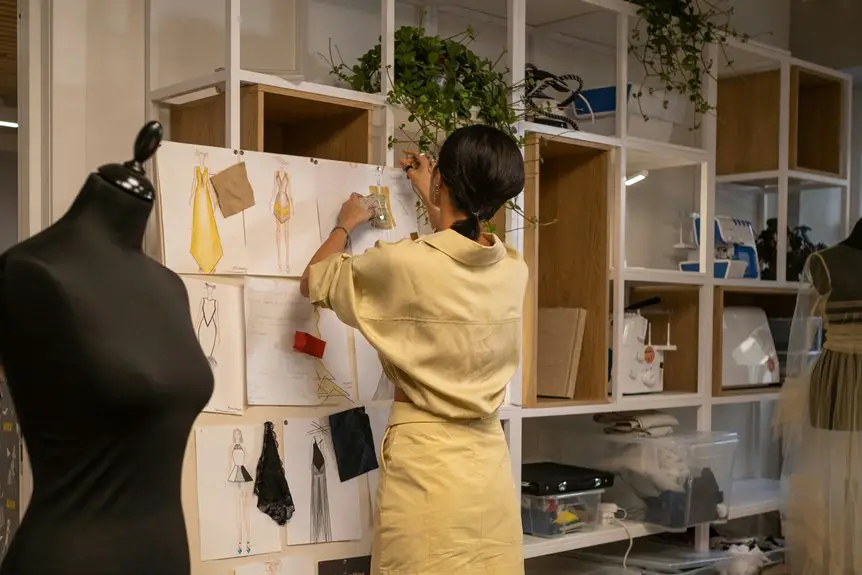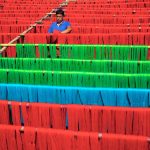If you’re looking for top fabrics in Dhaka, Jamdani Muslin and Tangail Cotton blend heritage with comfort, while Dhakai Silk offers luxury with intricate weaves. Nakshi Kantha embroidery brings stories to life through thread. For tailoring, Bibi Tailors excel in timeless craftsmanship, Kay Kraft offers trendy, eco-friendly styles, and Haji Tailors provide bespoke fits. Bengal Textiles innovates with modern fabric technology. Keep exploring to discover how these fabrics and tailors perfectly unite tradition and style.
Table of Contents
Key Takeaways
- Jamdani Muslin is a renowned traditional fabric of Dhaka, celebrated for its intricate patterns and lightweight texture, ideal for special occasions.
- Nakshi Kantha embroidery showcases rich cultural narratives through detailed stitching, symbolizing heritage and social significance.
- Tailors like Aarong and Bibi Tailors combine traditional craftsmanship with personalized fittings, ensuring quality and timeless style.
- Contemporary fabric innovations by Bengal Textiles include moisture-wicking cotton and eco-friendly dyes, enhancing comfort and sustainability.
- Dhakai Silk and Tangail Cotton represent Dhaka’s textile heritage with unique weaving techniques and breathable, durable fabrics suitable for diverse occasions.
Jamdani Muslin: The Heritage Fabric of Dhaka
Jamdani Muslin stands as a timeless symbol of Dhaka’s rich textile heritage. When you choose Jamdani, you’re embracing a fabric woven with centuries-old techniques passed down through generations.
This fine muslin is celebrated for its sheer, lightweight texture and intricate geometric patterns, created entirely by hand on traditional looms. You’ll notice the elegance and sophistication it brings to any garment, making it perfect for special occasions or adding a touch of cultural pride to your wardrobe.
Supporting Jamdani artisans means you’re preserving a precious craft that dates back to the Mughal era.
Nakshi Kantha Embroidery: Crafting Stories in Thread
You’ll find Nakshi Kantha embroidery rich with history and cultural meaning, telling stories through each stitch.
The unique techniques and intricate design patterns make every piece a work of art.
Let’s explore how these threads connect tradition and creativity in Dhaka’s fabric scene.
History and Cultural Significance
Nakshi Kantha embroidery weaves rich stories into every stitch, reflecting the vibrant history and culture of Bangladesh. When you explore this craft, you connect with centuries-old traditions passed down through generations, mainly by rural women.
Originally, Nakshi Kantha began as a way to repurpose old saris and cloth, turning them into beautifully embroidered quilts and garments. You’ll find that each piece carries symbolic motifs representing nature, folklore, and daily life, making it more than just decoration—it’s a cultural narrative.
This embroidery also plays an essential role in social ceremonies and rituals, symbolizing heritage and identity. By appreciating Nakshi Kantha, you embrace a living art form that honors Bangladesh’s past while inspiring future creativity.
Techniques and Design Patterns
Every stitch in this embroidery tells a story, crafted through simple yet skillful techniques passed down through generations.
When you explore Nakshi Kantha, you’ll notice the running stitch forms the foundation, creating a textured surface. You’ll also find motifs inspired by nature—flowers, birds, and geometric shapes—that reflect local life and beliefs.
As you work, layering these patterns brings depth and meaning to each piece. You’ll appreciate how artisans combine symmetry with freehand designs, making every embroidery unique.
By understanding these techniques and patterns, you connect with a rich tradition that merges art and storytelling.
When you wear or display Nakshi Kantha, you carry these narratives, beautifully woven in thread, keeping heritage alive in a modern world.
Dhakai Silk: Luxurious Textiles From the Capital
You’ll appreciate how Dhakai silk stands out with its unique weaving techniques that have been perfected over generations.
This fabric carries deep cultural significance, symbolizing heritage and artistry in every thread.
Keep an eye out for popular Dhakai designs that blend tradition with elegance, making each piece truly special.
Unique Weaving Techniques
A rich heritage of unique weaving techniques sets Dhakai silk apart as one of Dhaka’s most luxurious textiles.
When you examine a Dhakai saree, you’ll notice the intricate Jamdani patterns created using a supplementary weft technique. This method involves weaving additional threads into the base fabric, forming delicate floral and geometric motifs that seem to float on the silk.
You’ll also appreciate the meticulous handloom process, where skilled artisans use traditional pit looms, maintaining tight tension to achieve the fabric’s characteristic lightness and strength.
The combination of fine silk threads with these time-honored weaving methods makes each piece not just a garment, but a work of art.
Cultural Significance
The intricate weaving techniques behind Dhakai silk don’t just create beautiful patterns—they carry deep cultural meaning. When you wear or gift Dhakai silk, you’re embracing centuries of tradition and heritage.
Here’s why it matters:
- Symbol of Status: Dhakai silk has long been a marker of prestige in Bangladeshi society.
- Ritual Importance: It plays a crucial role in weddings and religious ceremonies.
- Cultural Identity: The fabric represents Dhaka’s rich artisan history and local pride.
- Storytelling: Each motif and weave tells a story passed down through generations.
Popular Dhakai Designs
Several popular Dhakai designs have captivated both locals and visitors with their intricate patterns and vibrant colors.
When you explore Dhakai silk textiles, you’ll notice motifs like the famous Jamdani pattern, featuring geometric shapes and floral elements woven delicately by skilled artisans.
You’ll also find designs inspired by nature, such as leaves, vines, and birds, which add elegance and symbolism to the fabric.
If you’re looking for something bold, the checkerboard or lattice patterns provide a striking visual appeal while maintaining traditional roots.
Each design tells a story, reflecting the rich heritage of Dhaka’s weaving community.
As you choose your Dhakai fabric, these patterns not only enhance the luxurious feel but also connect you to centuries of craftsmanship and culture.
Tangail Cotton: Comfort Meets Tradition
You’ll find that Tangail cotton stands out for its unique blend of comfort and tradition.
This fabric offers you a breathable texture perfect for Dhaka’s climate, while carrying centuries of cultural heritage.
When you choose Tangail cotton, here’s what you get:
- Softness that lets your skin breathe all day long.
- Durable weave ensuring your garment lasts through many wears.
- Traditional patterns that connect you to Bangladeshi artistry.
- Lightweight feel making it ideal for both casual and formal occasions.
Jamdani Weaving Centers: Where Art Meets Fabric
When you explore Jamdani weaving centers, you’ll discover a rich history that dates back centuries.
The artisans use intricate handloom techniques to create stunning, delicate patterns on fabric.
You’ll appreciate how this craftsmanship turns each piece into a true work of art.
History of Jamdani
Jamdani, a timeless symbol of Bangladeshi heritage, carries centuries of craftsmanship woven into every thread.
When you explore its history, you’ll find deep cultural roots and royal patronage that shaped its legacy.
Here’s what you should know:
- Jamdani dates back to the 4th century BCE and flourished during the Mughal era.
- It originated in the Dhaka region, where skilled weavers created intricate designs by hand.
- The fabric was once reserved for royalty and nobility, symbolizing status and elegance.
- UNESCO recognized Jamdani weaving as an Intangible Cultural Heritage in 2013, preserving its importance.
Understanding this rich history helps you appreciate the fabric beyond its beauty, connecting you to a living tradition.
Craftsmanship Techniques
Mastering the art of Jamdani weaving involves intricate hand techniques passed down through generations.
When you visit Jamdani weaving centers in Dhaka, you’ll witness artisans meticulously inserting supplementary weft threads into the fine cotton base, creating elaborate motifs.
These weavers work on traditional looms, skillfully manipulating each thread by hand without relying on machines.
You’ll notice how they interlace geometric shapes, floral patterns, and symbolic designs that reflect cultural stories.
The process demands patience, precision, and a deep understanding of fabric tension and thread placement.
As you observe, you’ll appreciate how every piece is unique, blending artistry with craftsmanship.
Tailoring Excellence at Aarong
Aarong sets the standard for tailoring excellence in Dhaka, blending traditional craftsmanship with modern designs. When you choose Aarong, you’re not just buying clothes; you’re investing in artistry and quality.
Here’s what makes Aarong stand out:
- Expert Tailors: Skilled artisans guarantee every stitch is perfect, respecting cultural heritage.
- Premium Fabrics: You’ll find a curated selection of high-quality materials sourced locally.
- Customization: They tailor garments to fit your unique style and measurements flawlessly.
- Sustainable Practices: Aarong prioritizes eco-friendly processes, so your purchase supports ethical fashion.
With Aarong, you experience a seamless fusion of tradition and innovation, making it a top choice for anyone seeking impeccable tailoring in Dhaka.
The Legacy of Bibi Tailors
Although Bibi Tailors has been around for decades, it continues to attract new customers with its commitment to quality and tradition.
When you step into their shop, you immediately notice the skilled craftsmanship that’s been perfected over generations. They don’t just sew clothes; they create lasting impressions with every stitch.
You’ll appreciate how they blend classic tailoring techniques with personalized fittings to guarantee your outfit fits perfectly. Their reputation isn’t just about heritage—it’s about consistently delivering garments that meet modern standards while honoring time-tested methods.
If you want tailoring that respects tradition without compromising on quality, Bibi Tailors is a name you can trust.
Their legacy is clear: timeless style made just for you.
Modern Designs at Kay Kraft
When you choose Kay Kraft, you step into a world where tradition meets innovation. Their modern designs blend classic craftsmanship with contemporary flair, perfect for anyone seeking fresh styles without losing cultural roots.
Here’s what makes Kay Kraft stand out:
- Trendy fabric selections that keep you ahead in fashion.
- Bold patterns paired with subtle, elegant embroidery.
- Customizable options tailored to your personal style.
- Eco-friendly materials that respect the environment.
At Kay Kraft, you’re not just buying fabric; you’re investing in a look that’s uniquely yours.
Their designers constantly update collections, ensuring you find pieces that fit every occasion, from casual outings to formal events.
Embrace modernity with a touch of heritage at Kay Kraft.
Bespoke Tailoring Services by Haji Tailors
Haji Tailors delivers bespoke tailoring services that cater directly to your unique measurements and style preferences. You’ll appreciate how they blend traditional craftsmanship with your personal taste, ensuring every garment fits perfectly and looks exceptional. Whether you want a classic sherwani or a modern suit, they make the process smooth and enjoyable.
Here’s a quick look at what you can expect from Haji Tailors:
| Service Aspect | What You Get |
|---|---|
| Measurement | Precise, personalized fitting |
| Fabric Selection | Wide range of premium options |
| Style Consultation | Expert advice tailored to you |
| Stitching Quality | Durable, neat, and refined |
| Delivery Time | Prompt with attention to detail |
With Haji Tailors, you get a garment as unique as you are.
Contemporary Fabric Innovations at Bengal Textiles
Bengal Textiles offers five standout fabric innovations that revolutionize how you experience comfort and style. When you choose their materials, you get more than just quality—you get technology woven into every thread.
Discover fabric innovations by Bengal Textiles that seamlessly blend comfort, style, and cutting-edge technology.
Here are four innovations you’ll appreciate:
- Moisture-Wicking Cotton: Keeps you dry and comfortable, perfect for Dhaka’s humid climate.
- Anti-Wrinkle Blends: Save time on ironing while maintaining a sharp look all day.
- Eco-Friendly Dyes: Enjoy vibrant colors without harming the environment.
- Stretch-Enhanced Fabrics: Move freely with fabrics that flex without losing shape.
These innovations make Bengal Textiles a top choice if you want fabrics that blend tradition with modern performance, enhancing your wardrobe with practicality and style.
Frequently Asked Questions
What Are the Price Ranges for Fabrics in Dhaka?
You won’t believe it, but fabric prices in Dhaka can range from dirt-cheap to outrageously fancy. You’ll find options from just a few hundred takas to premium silks costing thousands—so there’s something for every budget!
How Long Does Tailoring Usually Take in Dhaka?
Tailoring usually takes about 3 to 7 days, but it can vary depending on the complexity and workload. If you’re in a hurry, you can often request express service, though it might cost extra.
Are These Fabrics Suitable for All Seasons?
Whether it’s summer’s heat or winter’s chill, you’ll find fabrics that breathe or insulate. You can’t have one fabric for all seasons, but you can choose wisely to stay comfortable year-round.
Can International Customers Order Online From These Tailors?
You can definitely order online from many tailors, as they’ve embraced international shipping and customization. Just check their websites or contact them directly to confirm shipping options, measurements, and delivery times before placing your order.
What Payment Methods Do These Tailors Accept?
You’ll find these tailors accept various payment methods like cash, credit/debit cards, and mobile wallets. Many also support international payments through platforms like PayPal or bank transfers, making it convenient for you to pay securely.
- What Is Thermal Bonded Nonwoven Fabric? - July 11, 2025
- The Impact of Fiber Type on Nonwoven Fabric Properties - July 11, 2025
- Nonwoven Fabric in the Furniture and Bedding Industry - July 11, 2025





